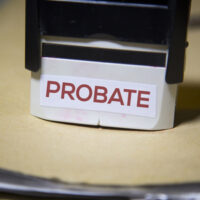Distinguishing Between Probate and Non-Probate Assets

The process of administering and probating a last will and testament involves figuring out what assets are estate versus non-estate (or probate versus non-probate) assets. And executor must make this distinction in order to properly address with estate taxes.
Probate/Estate Assets
The general rule is that all probate assets are assets that must pass under the will. This includes some bequests, funds, certain types of property, bank accounts, and other intangible assets that are specified to pass pursuant to the will. This also typically includes any assets that are in the name of the decedent that do not have a right of survivorship and accounts that do not have beneficiary designations even though they should, such as life insurance policies.
Probate assets also include property that is owned as tenants in common, where each owner has a percentage interest. Only if the decedent retitles his tenant-in-common interest in the name of a trust does it become a non-probate asset, and just in case a decedent forgets to include some assets in their trust—particularly if they acquire the assets after they have created their living trust—they can create a pour-over will to direct property that is outside of the trust into the trust at their death. However, it is important to note that these asses will still be subject to probate.
Non-Probate/Non-Estate Assets
Non-probate assets include all of those that pass outside the estate. This includes anything that has a right of survivorship. It is important to note that most residences pass in this manner because they are titled as joint tenants with right of survivorship. However, note that, if the property was owned by the decedent alone, it can pass onto the estate. Other non-probate assets include accounts that have beneficiaries named, such as IRAs, 401(k)s, insurance policies, investments, and more. In addition, if you set up an account as “payable on death” it will pass onto your named beneficiary and will not have to pass through probate.
Speak with an Estate Planning Attorney to Find the Exceptions
It is important to note that there are exceptions to the general rule that everything listed under the will without a beneficiary designation is a probate asset versus anything that is not named in the will and has a beneficiary designation is a non-probate asset. It makes sense to consult an experienced estate planning attorney to make sure that you know where the exceptions exist and how to address them. For example, if a named beneficiary predeceased the decedent, you may have an exception on your hands, and the asset can become part of the decedent’s probate estate. This sometimes includes, for example, health/medical savings accounts and annuities.
If you live in Florida and have questions about estate (or probate) versus non-estate (or non-probate) assets, contact our experienced Orlando probate attorneys at Gierach and Gierach, P.A. to find out how we can help.
Resource:
natlawreview.com/article/estate-vs-non-estate-assets
https://www.gierachlaw.com/high-priority-tips-advice-for-estate-planning-avoiding-probate/
